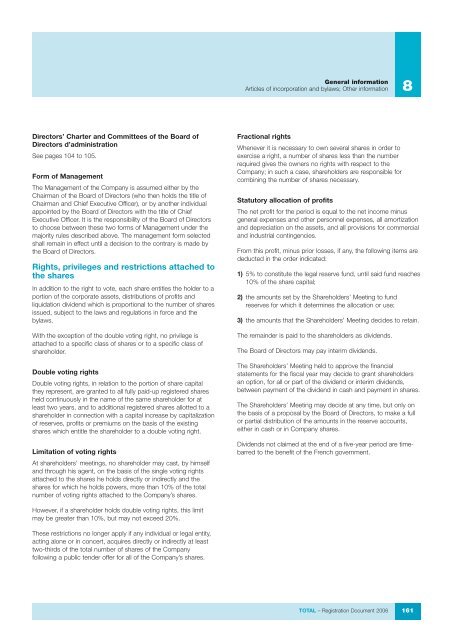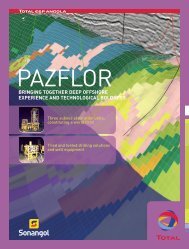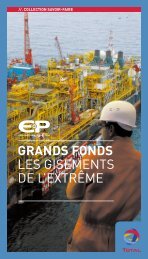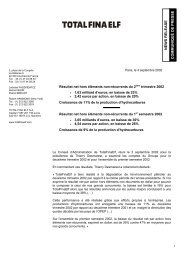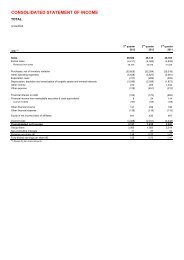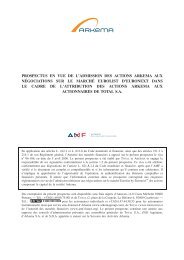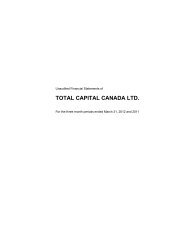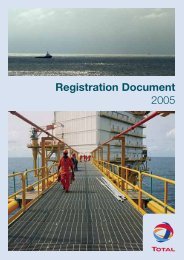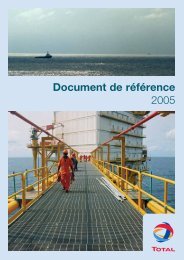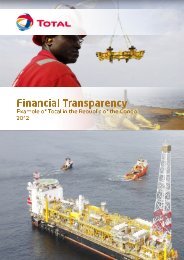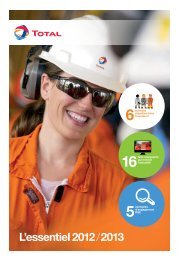Registration document 2007 - Total.com
Registration document 2007 - Total.com
Registration document 2007 - Total.com
You also want an ePaper? Increase the reach of your titles
YUMPU automatically turns print PDFs into web optimized ePapers that Google loves.
Directors’ Charter and Committees of the Board of<br />
Directors d’administration<br />
See pages 104 to 105.<br />
Form of Management<br />
The Management of the Company is assumed either by the<br />
Chairman of the Board of Directors (who then holds the title of<br />
Chairman and Chief Executive Officer), or by another individual<br />
appointed by the Board of Directors with the title of Chief<br />
Executive Officer. It is the responsibility of the Board of Directors<br />
to choose between these two forms of Management under the<br />
majority rules described above. The management form selected<br />
shall remain in effect until a decision to the contrary is made by<br />
the Board of Directors.<br />
Rights, privileges and restrictions attached to<br />
the shares<br />
In addition to the right to vote, each share entitles the holder to a<br />
portion of the corporate assets, distributions of profits and<br />
liquidation dividend which is proportional to the number of shares<br />
issued, subject to the laws and regulations in force and the<br />
bylaws.<br />
With the exception of the double voting right, no privilege is<br />
attached to a specific class of shares or to a specific class of<br />
shareholder.<br />
Double voting rights<br />
Double voting rights, in relation to the portion of share capital<br />
they represent, are granted to all fully paid-up registered shares<br />
held continuously in the name of the same shareholder for at<br />
least two years, and to additional registered shares allotted to a<br />
shareholder in connection with a capital increase by capitalization<br />
of reserves, profits or premiums on the basis of the existing<br />
shares which entitle the shareholder to a double voting right.<br />
Limitation of voting rights<br />
At shareholders’ meetings, no shareholder may cast, by himself<br />
and through his agent, on the basis of the single voting rights<br />
attached to the shares he holds directly or indirectly and the<br />
shares for which he holds powers, more than 10% of the total<br />
number of voting rights attached to the Company’s shares.<br />
However, if a shareholder holds double voting rights, this limit<br />
may be greater than 10%, but may not exceed 20%.<br />
These restrictions no longer apply if any individual or legal entity,<br />
acting alone or in concert, acquires directly or indirectly at least<br />
two-thirds of the total number of shares of the Company<br />
following a public tender offer for all of the Company’s shares.<br />
General information<br />
Articles of incorporation and bylaws; Other information<br />
Fractional rights<br />
Whenever it is necessary to own several shares in order to<br />
exercise a right, a number of shares less than the number<br />
required gives the owners no rights with respect to the<br />
Company; in such a case, shareholders are responsible for<br />
<strong>com</strong>bining the number of shares necessary.<br />
8<br />
Statutory allocation of profits<br />
The net profit for the period is equal to the net in<strong>com</strong>e minus<br />
general expenses and other personnel expenses, all amortization<br />
and depreciation on the assets, and all provisions for <strong>com</strong>mercial<br />
and industrial contingencies.<br />
From this profit, minus prior losses, if any, the following items are<br />
deducted in the order indicated:<br />
1) 5% to constitute the legal reserve fund, until said fund reaches<br />
10% of the share capital;<br />
2) the amounts set by the Shareholders’ Meeting to fund<br />
reserves for which it determines the allocation or use;<br />
3) the amounts that the Shareholders’ Meeting decides to retain.<br />
The remainder is paid to the shareholders as dividends.<br />
The Board of Directors may pay interim dividends.<br />
The Shareholders’ Meeting held to approve the financial<br />
statements for the fiscal year may decide to grant shareholders<br />
an option, for all or part of the dividend or interim dividends,<br />
between payment of the dividend in cash and payment in shares.<br />
The Shareholders’ Meeting may decide at any time, but only on<br />
the basis of a proposal by the Board of Directors, to make a full<br />
or partial distribution of the amounts in the reserve accounts,<br />
either in cash or in Company shares.<br />
Dividends not claimed at the end of a five-year period are timebarred<br />
to the benefit of the French government.<br />
TOTAL – <strong>Registration</strong> Document 2006 161


